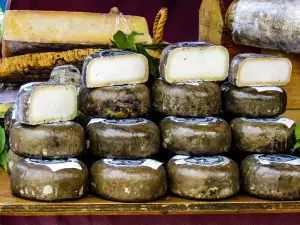Comte is a French cheese made from unpasteurized cow's milk. It is also known as Gruyère de Comté. Along with Camembert, Beaufort and Münster, it is on the list of the most popular cheeses in France.
Comte also belongs to the AOCs with the status of AOC / Appellation d'Origine Contrôlée /, which guarantees the region of their origin. The technology by which the cheese is produced is also strictly controlled. In this case we are talking about cheese, which is made only in a few areas in France. Comte is produced in the Rhone and Lorraine Valley, Jura region. It is also permissible in Burgundy.
History of Comte
Comte is a dairy product with a long history. It turns out that as early as the twelfth century, the cheese was already known by the French. During the summer, shepherds spent much of their time in remote huts located in the Jura region. Due to the great distance they traveled from their huts to the settlements, the cheese had to mature for a long time.
The shepherds, who were nearby, gathered their milk together and prepared large cheeses, which they offered on the market at the end of the season. Little by little, the cheese became popular and quickly became an indispensable guest at the French table. That way, in 1958, Comte acquired AOC status.
Comte production
Comte production is no easy task. At least because it takes just twelve kilograms of cow's milk to make just one kilogram of the popular French cheese. It is also a curious clarification that about 600 liters of milk are used in one production cycle. Another detail is that this type of cheese is produced only from the milk of cows of a special breed, namely Monbeliarde. It is said that the technology of making cheese has been zealously kept the same for centuries.

So, in order to make the dairy product, milk from two consecutive milkings is used. That is, milk obtained in the evening and milk obtained the next morning is used. The preparation itself begins after the morning milking.
Cow's milk is placed in a large copper vessel, so that it can then be warmed. It is usually heated to 31-33 degrees. Once this process is in place, it's time for the next step - adding yeast. Thanks to it, the cheese consistency thickens in about half an hour.
When this process takes place, the resulting mass is crushed into very small pieces. The pieces obtained in this way are subjected to heating and the temperature should very smoothly reach 54 degrees. Meanwhile, the milk substance is stirred regularly. This process takes about 30-40 minutes. The next step requires pouring the resulting mass into a special mold. It is stored there for 24 hours. During this time, the cheese is turned over several times.
When this step is finalized, it is time for the cheese to mature. For this purpose, Comte is placed in underground warehouses, where temperatures are relatively low. Interestingly, during ripening, something like secondary fermentation takes place, thanks to which the cheese acquires a specific aroma. Otherwise, the full maturation of Comte takes between four months and a year. Of course, it is possible that some individual varieties are left to mature a little longer.

Comte features
Comte is available on the market in a round form with a diameter of 40 to 70 centimeters. They are between 9 and 15 centimeters high and weigh between 30 and 60 centimeters. A distinctive feature of Comte cheese is the new crust, which is yellow, ocher or gray. It has a relatively smooth surface. Under the crust you will find a not very soft interior, which is colored yellowish.
It is thick and with a pleasant fat content of at least 45 percent. The dairy product is characterized by a pleasantly salty taste. However, it also has a sweet aftertaste. However, this only complements and balances the taste qualities of Comte. We must also note that there are very delicate flavors of nuts.
Cooking with Comte
The refined but very delicate taste of Comte makes the cheese a real sensation in cooking. It can be served on its own, cut into thin slices, or put in a bunch of interesting and appetizing dishes. Comte's light tones make it a suitable addition to thick and rich white wines such as Pinot Blanc. In general, white wines are suitable dry, semi-dry, semi-sweet and dessert. At the same time, it is great combined with red wines, including syrah, pinot noir and mavrud.
A positive feature of Comte is that due to its firm consistency, the cheese can be used in the preparation of dishes that require heat treatment. For example, it can be used in the preparation of pizzas, sandwiches, casserole, spaghetti, pasta.
It is very nicely combined with dishes with potatoes or mushrooms. It is also successfully combined with greens such as cucumbers, tomatoes, Brussels sprouts, spinach, nettles, broccoli and others. It can also be used in recipes for meat dishes, as it perfectly harmonizes the taste of specialties with chicken, duck and turkey. It also complements heavier meats such as pork, beef, veal and lamb.




















Comments